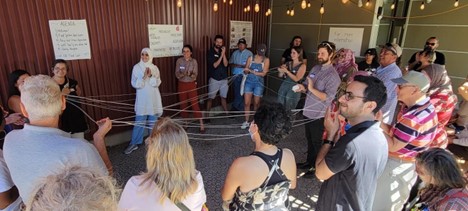New research by UB Food Lab member Carol E Ramos-Gerena in the Journal of Agriculture, Food Systems, and Community Development
DOI: https://doi.org/10.5304/jafscd.2023.122.008

INTRODUCTION
Food policies should be informed by those who they intend to serve, but policy-making processes remain exclusive to privileged voices, knowledge, and experiences. This article bridges food and policy scholarship with the critical literacy work of Paulo Freire to answer: how do we understand literacies tied to food policy? What does (or, what could) it mean to be food policy literate? In a new JAFSCD article, Carol E. Ramos-Gerena proposes five principles for conceptualizing critical food policy literacy that support food system transformations.
KEY FINDINGS
The paper suggests that efforts to promote critical food policy literacy must facilitate communities to (a) “read the world,” (b) “read the word,” (c) be critically aware of food policy processes and systems, (d) learn contextually and through authentic practice, and (e) enable people to negotiate and transform the world (their context) collectively.
RECOMMENDATIONS FOR POLICY, PRACTICE, AND RESEARCH
Possessing knowledge on engaging with food policy processes is not commensurate with actual engagement. Thus, structural barriers to community participation must also be addressed. Food system planners and educators, particularly at the municipal level, should support locally-based citizen food organizations to engage in food policy. This support must go beyond assessing communities’ food policy literacy. Instead, it must intend to bridge the gap to ensure critical readiness for food policy engagement.
For questions and suggestions, contact us at foodsystems@ap.buffalo.edu.